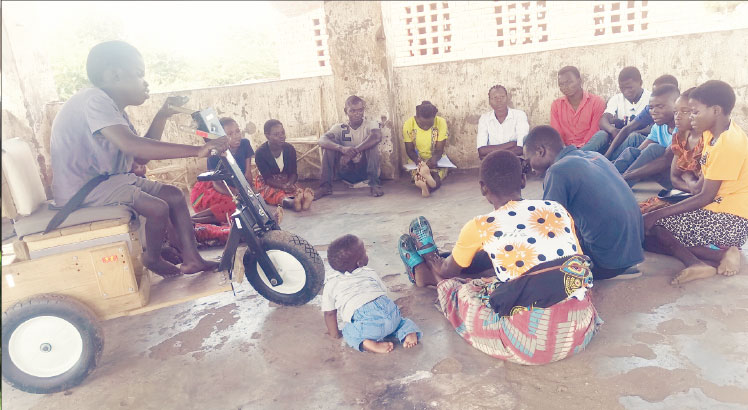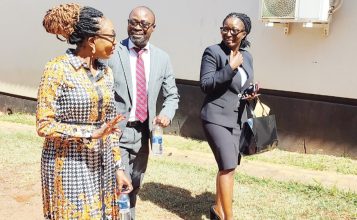Tapping from CDF to bail out needy students
When Ruth Ganunga, 13, from group village head Chikhawo, Traditional Authority (T/A) Tengani in Nsanje District got selected to Nyangwale Community Day Secondary School, she started seeing her dream of becoming a nurse coming to fruition.
The third born in a family of six, Ruth had always wanted to be educated to support her siblings and parents. Therefore, the news of her selection to secondary school could not have been sweeter.
But her excitement, short-lived as she could not complete Form One due to lack of fees.

Ruth dropped out of school in the third term because her parents could not raise K7 500 as fees.
“It was a devastating experience as I saw my dream of becoming a nurse crumbling before my eyes. The idea of getting married never occurred to me,” she says.
In the same year, Development Communication Trust with funding from United Nations Children’s Fund (Unicef) started implementing a Child and Youth Friendly Community Services Initiative in Chikwawa and Nsanje district councils, a project that would later become an eye-opener to Ruth and her community.
Development Communications Trust executive director Prince Mtelera says the project champions the involvement of children in planning, budgeting, implementation as well as social accountability of development initiatives in their respective villages.
He says: “In Malawi, there is decentralisation where citizens are supposed to participate in the processes of the council.
“So, the first process is where children are involved in the planning of Village Action Plans [VAPs] where children have to be present even when budgets are being done up to the point where they are referred to councils for budgeting.
“Children also participate in implementation and are also involved in social accountability aspect which gives them power to hold duty-bearers accountable.”
Mtelera adds that children are also supposed to participate in monitoring to see whether their issues are included in the district plans.
He says: “So, basically, the project empowers young people, especially children, adolescents and the youth to participate in the process mentioned.
“Malawi is one of the countries where children are not regarded as very relevant in decision-making processes.
“We believe that when we engage them, we are going to get the development that are child-centric and child-initiated initiatives.”
To ensure that the children and youths take part, the project initiated the establishment of community structures such as Children’s Corner, Youth Networks and Social Accountability Forums where they are empowered to have a say, their rights valued and respected and are able to demand essential services they require.
Luckily for Ruth, through the project, Chikwawo Children’s Corner was established in her area and it played a vital role in helping her access bursary under Constituency Development Fund (CDF) to return to school.
Chikhawo Children’s Corner chairperson Finiyasi Valeya says the project made the children and youth aware of what is in the CDF and how they can demand the same from authorities.
He says: “Through the project, we knew that in CDF, there is a provision for bursaries to needy students so we set that out in VAP, demanding that children from our village should benefit from the bursary programme too.
“After the VAP was submitted to the district council, the area development committee [ADC] through our village development committee [VDC] gave us a nod to search for needy students to be incorporated in the bursary programme.”
Valeya says all along, the bursary had been benefiting only those with connections to politicians, leaving out needy and deserving students.
“But that changed when we learnt that any community can demand for such bursary. As a result, we now have five students in our village, including Ruth, who are benefiting from the CDF bursary,” says Valeya.
Ruth is now full of appreciation. She says she could not have accessed the CDF bursary if it were not for the guidance she and her community got through the project.
“I am back in school and I have just written Junior Certificate of Education examination. I am hopeful that I will do well and finish my studies and be what I have always wanted to be,” she says.
Tengani ADC chairperson Benjamin Songera says so far, 211 students from Nsanje Central Constituency are now on bursary provided by the district council.
He says: “Our children never knew how the bursary works and who is eligible to benefit. As such, only 30 to 35 students were benefiting. But now, a lot of children have started benefiteding. VDCs are now able to identify needy students in a transparent manner.”
Songera adds that through the project, they have also been able to know that the fund includes a 10 percent allocation meant for children and the youth.
Nsanje district social welfare officer Chikumbutso Salifu says currently, there are 861 students on bursary in community day secondary schools as well as district and national secondary schools.
He says: “Out of the 861, 221 are under Camfed bursary. Our plan is to reach out to 1 200 students every academic year.
“To achieve that, we are promoting coordination among the bursary providers in the recruitment of children into bursaries in order to avoid duplication of beneficiaries,” says Salifu.





